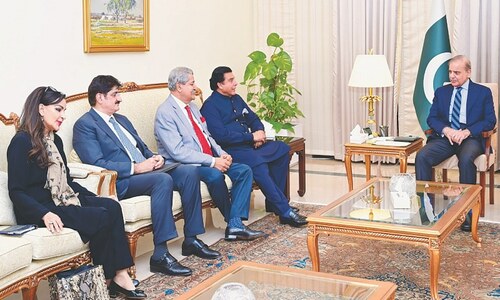ISLAMABAD: Conflicting signals emerged from Delhi on Monday as Indian Prime Minister Narendra Modi greeted his Pakistani counterpart Nawaz Sharif on Pakistan Day, but the (Indian) Ministry of External Affairs (MEA) dampened the mood with its sharp reaction to Pakistani envoy’s invitation to Hurriyat leaders to a reception at the High Commission and junior foreign minister’s ‘indisposed’ participation in it.
Prime Minister Modi in a twitter posting disclosed that he had greeted Mr Sharif on Pakistan Day.
“I have written to Pakistan PM Mr Nawaz Sharif, conveying my greetings on the National Day of Pakistan,” Mr Modi tweeted.
He also suggested the way forward in the relationship, saying: “It is my firm conviction that all outstanding issues can be resolved through bilateral dialogue in an atmosphere free from terror and violence.”
Mr Modi had earlier this month sent his foreign secretary S. Jaishankar to Islamabad as part of a regional outreach. The foreign secretary’s visit worked as an ice breaker for the bilateral relationship that has been stalemated since January 2013.
(President Mamnoon Hussain, in his speech at the Pakistan Day parade, said Pakistan wanted to resolve all outstanding issues with India amicably. He emphasised that resolution of Jammu and Kashmir issue as per the aspirations of Kashmiri people and in the light of United Nations resolutions was the key to regional security and peace.)
Mr Modi’s recent overtures notwithstanding, the bitterness of the past few years doesn’t seem to be going away soon.
Indian ministry reacts sharply to invitation for Hurriyat leaders to Pak HC’s reception in New Delhi
In a repeat of the events that led to cancellation of foreign secretary level talks in August last year, Indian Ministry of External Affairs objected to Pakistani High Commission’s (Delhi) invitation for Hurriyat leaders to the Pakistan Day reception.
The curt MEA reaction was provoked by High Commissioner Abdul Basit’s media comments that the Indian government had no objection to his meetings with Hurriyat leaders.
Mr Basit had said: “I don’t think the Indian government is objecting to our meeting with Hurriyat leaders. I would rather suggest to my media friends not to make an issue out of a non-issue.”
But his unsuspecting remarks annoyed the MEA whose spokesperson Syed Akbaruddin responded by saying: “Government of India prefers to speak for itself. Let me reiterate there are only two parties and there is no place for a third party in resolution of India-Pakistan issues.
“The only way forward to proceed on all outstanding issues is a peaceful bilateral dialogue within the framework of Simla Agreement and Lahore Declaration.”
The drama created by MEA’s overreaction to high commissioner’s reply to media questions at one point threatened Indian Minister of State for External Affairs General V.K. Singh’s participation in the reception. The junior foreign minister had been nominated by the government to be chief guest at the reception.
Gen Singh reportedly refused to attend the ceremony, but was pressurised by the Prime Minister’s Office to attend. Gen Singh joined the reception late and stayed there for no more than 10 minutes.
After returning from the reception, Gen Singh posted a series of five cryptic tweets expressing his discomfort over being forced to attend the reception.
The tweets bearing hashtags #Duty and #Disgust reflected the mood of the general, who earlier served as Indian army chief.
“#DUTY A task or action that a person is bound to perform for moral or legal reasons,” he defined in a tweet. He then posted: “#DUTY The force that binds one morally or legally to one’s obligations.” It further said: “#DUTY A job or service allocated.”
He then began defining disgust: “#DISGUST To sicken or fill with loathing.” “#DISGUST To offend the moral sense, principles, or taste of,” was his final tweet.
But in none of his tweets, he directly referred to the Pakistan Day reception.
It was, however, amply clear that having been posted immediately after attending the Pakistan Day reception, the general was referring to his participation in the event.
Published in Dawn March 24th , 2015
On a mobile phone? Get the Dawn Mobile App: Apple Store | Google Play















































Dear visitor, the comments section is undergoing an overhaul and will return soon.